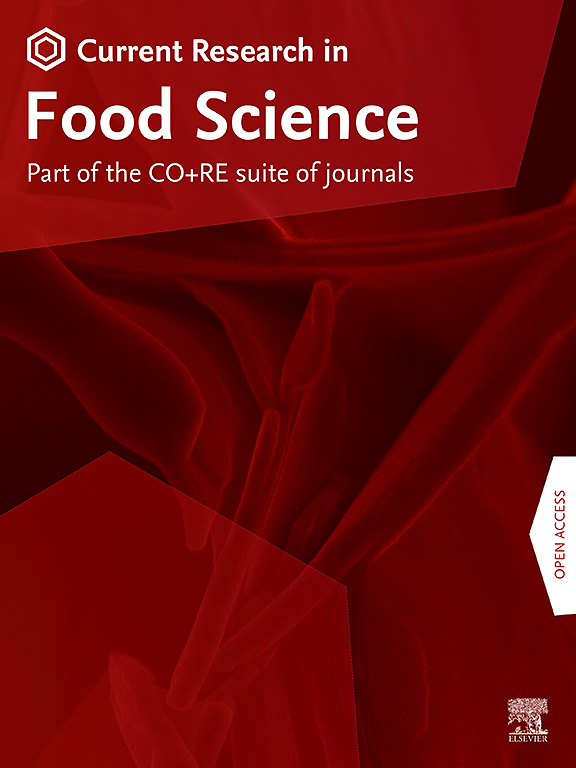Modulation of the human fecal metabolome – Effect of polyphenols depends on the BMI
IF 6.2
2区 农林科学
Q1 FOOD SCIENCE & TECHNOLOGY
引用次数: 0
Abstract
Health effects associated with microbial metabolites are influenced by dietary compounds and other environmental factors. Polyphenols derived from plant-based foods reach the large intestine mostly undigested, where they can interact with the gut microbiota. This explorative study investigated the metabolic responses of gut microbiota to the polyphenols rutin and genistein. Ex vivo anaerobic incubations with pooled fecal samples from volunteers with a BMI <25 (n = 7) and a BMI >40 (n = 7) were analyzed by ESI DI-FT-ICR-MS. Differences in metabolic diversity were observed between the two BMI groups, with the obese group showing a less diverse metabolic response.
Metabolomic profiling identified 361 metabolites in 35 substance classes, with notable effects of the polyphenols on amino acid, carbohydrate, nucleotide, and lipid metabolism. Both BMI groups showed increased levels of dipeptides and amino acids and decreased levels of biogenic amines. Among the key findings, glutamine levels increased, which has been associated with obesity-related metabolic processes, while tryptophan levels were also elevated, a factor previously associated with obesity-related pathways. Glycine levels increased in both groups. Additionally, histamine, cadaverine, putrescine, and trimethylamine were reduced after exposure to the polyphenols.
Changes in metabolites related to carbohydrate metabolism suggest an influence of rutin and genistein on sugar transport and cell wall synthesis. Furthermore, in the obese group, rutin exposure was associated with increased butyrate levels and decreased lactate levels. These findings contribute to a better understanding of how rutin and genistein interact with the gut microbiota metabolome, with potential implications for metabolic health and obesity-related research.

人类粪便代谢组的调节-多酚的作用取决于体重指数
与微生物代谢物相关的健康影响受到膳食化合物和其他环境因素的影响。从植物性食物中提取的多酚到达大肠时大多未被消化,在那里它们可以与肠道微生物群相互作用。本探索性研究探讨了肠道菌群对芦丁和染料木黄酮多酚的代谢反应。采用ESI DI-FT-ICR-MS对BMI为25 (n = 7)和BMI为40 (n = 7)的志愿者粪便样本进行体外厌氧培养分析。在两个BMI组之间观察到代谢多样性的差异,肥胖组表现出较少的代谢反应多样性。代谢组学分析鉴定出35类物质中的361种代谢物,多酚对氨基酸、碳水化合物、核苷酸和脂质代谢有显著影响。两个BMI组都显示二肽和氨基酸水平升高,生物胺水平降低。在主要发现中,谷氨酰胺水平升高,这与肥胖相关的代谢过程有关,而色氨酸水平也升高,这是一个先前与肥胖相关途径有关的因素。两组的甘氨酸水平均有所升高。此外,暴露于多酚后,组胺、尸胺、腐胺和三甲胺减少。与碳水化合物代谢相关的代谢物的变化表明芦丁和染料木素对糖转运和细胞壁合成的影响。此外,在肥胖组中,芦丁暴露与丁酸盐水平升高和乳酸水平降低有关。这些发现有助于更好地了解芦丁和染料木素如何与肠道微生物代谢组相互作用,对代谢健康和肥胖相关研究具有潜在的意义。
本文章由计算机程序翻译,如有差异,请以英文原文为准。
求助全文
约1分钟内获得全文
求助全文
来源期刊

Current Research in Food Science
Agricultural and Biological Sciences-Food Science
CiteScore
7.40
自引率
3.20%
发文量
232
审稿时长
84 days
期刊介绍:
Current Research in Food Science is an international peer-reviewed journal dedicated to advancing the breadth of knowledge in the field of food science. It serves as a platform for publishing original research articles and short communications that encompass a wide array of topics, including food chemistry, physics, microbiology, nutrition, nutraceuticals, process and package engineering, materials science, food sustainability, and food security. By covering these diverse areas, the journal aims to provide a comprehensive source of the latest scientific findings and technological advancements that are shaping the future of the food industry. The journal's scope is designed to address the multidisciplinary nature of food science, reflecting its commitment to promoting innovation and ensuring the safety and quality of the food supply.
 求助内容:
求助内容: 应助结果提醒方式:
应助结果提醒方式:


